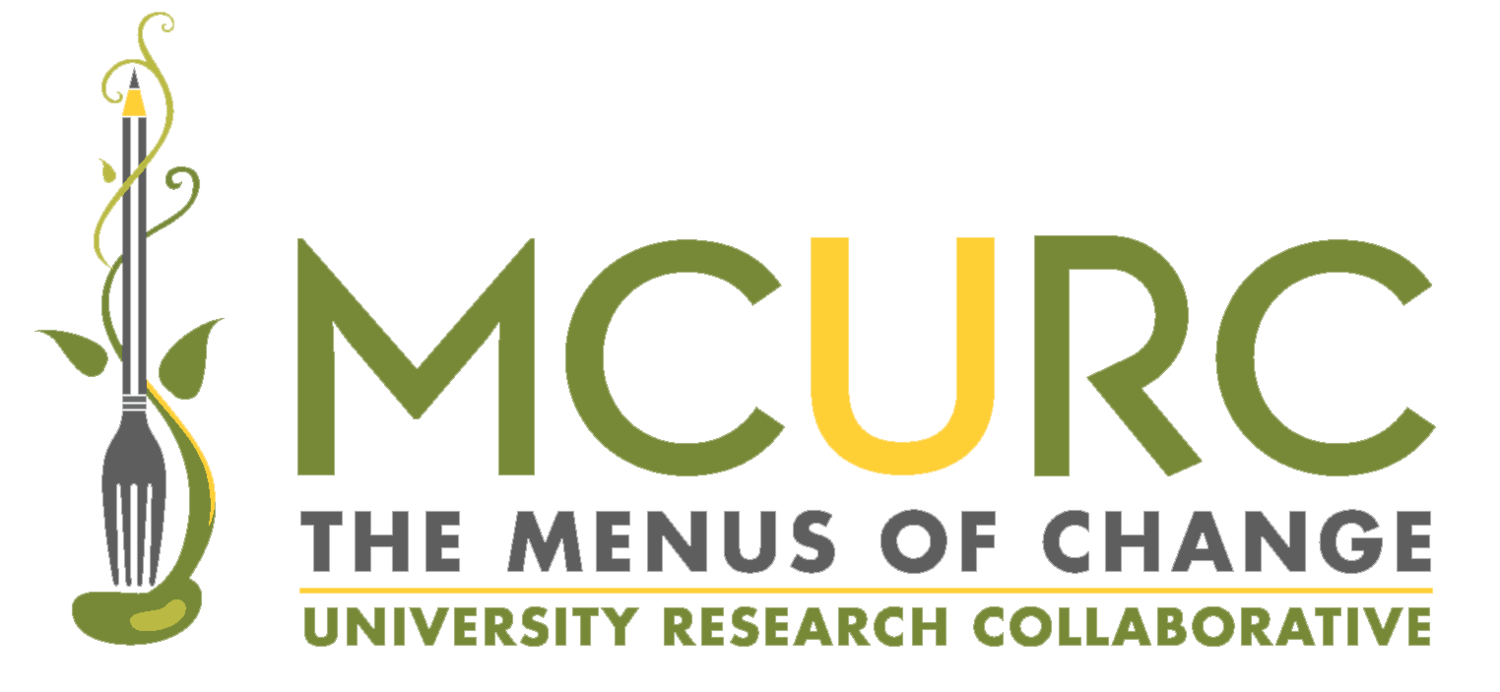
Research
MCURC Academic Publications
Training for Transformation: Examining Food Systems Courses at US Land-Grant Universities
Charlie T Hoffs, Nooran Chharan, Matthew J. Landry, Catherine P. Ward, Kemi A. Oyewole, May C. Wang, Sophie Egan, Janine Bruce, Christopher Gardner
Study published in Frontiers in Sustainable Food Systems
Abstract: Higher education institutions can play an essential role in preparing students to participate in movements for just and sustainable food systems change. For the past two decades, many United States land-grant universities (LGUs) have developed food systems education (FSE) courses. This study examined the extent to which FSE courses employ four capacities deemed crucial by the FSE literature: multidimensional approaches, interdisciplinarity, centering equity, and training students to take action in food systems. The syllabi of 171 undergraduate courses at 20 LGUs were obtained by contacting instructors, and their course descriptions and learning outcomes were analyzed. This subset of LGUs were identified from the membership list of the Menus of Change University Research Collaborative (MCURC), a nationwide network of colleges using campus dining halls and classrooms as living laboratories for food systems change. Most course descriptions and learning outcomes exhibited multidimensional approaches and interdisciplinarity. However, many failed to incorporate teaching content and practices that help students critically examine equity and social justice issues in food systems, or engage in transformative change. LGUs have both the resources and urgent responsibility to empower students to be part of movements to transform unjust, unsustainable food systems. The findings of this study, and an accompanying open-access syllabus website, aim to accelerate the development of FSE curricula that prepare students to change food systems.
Evaluating Food Procurement against the EAT-Lancet Planetary Health Diet in a Sample of U.S. Universities
Jaclyn Bertoldo, Abby Fammartino, Sophie Egan, Roni A. Neff, Rebecca Grekin, and Julia A. Wolfson
Study published in International Journal of Environmental Research and Public Health
Abstract: Aligning institutional food procurement with planetary health targets offers opportunities to improve nutrition and reduce food-related greenhouse gas (GHG) emissions. This study compared foods procured by 19 university dining programs in the U.S. in 2022 with the EAT-Lancet planetary health diet. Each university’s procurement was then modeled to align with the EAT-Lancet planetary health diet, and changes to Healthy Eating Index (HEI) scores and GHG emissions were evaluated. For a subset of universities that provided cost data, changes in annual total food costs were also estimated. Universities in this study exceeded EAT-Lancet planetary health targets for beef (x̅ = 657% of target), pork (x̅ = 587%), poultry (x̅ = 379%), and eggs (x̅ = 293%). All universities failed to achieve planetary health targets for legumes and nuts (x̅ = 39% of the target) and vegetables (x̅ = 68%). Aligning food procurement with the planetary health diet would result in an estimated average 46.1% reduction in GHG emissions and a 19.7 point increase in HEI scores. Universities that provided cost data saw an average 9.7% reduction in food costs in the EAT-Lancet-aligned scenario. The procurement metrics assessed in this study can help university dining programs and other institutional food service organizations set goals and monitor progress toward planetary health targets.
Food Waste Management Practices and Barriers to Progress in U.S. University Foodservice
Aviva A. Musicus, Ghislaine C. Amsler Challamel, Robert McKenzie, Eric B. Rimm, Stacy A. Blondin
Study published in International Journal of Environmental Research and Public Health
Abstract: Identifying institutional capacity to reduce and reallocate food waste is important to reduce both greenhouse gas emissions and food insecurity. The goal of this study was to examine food waste concern, reduction and repurposing strategies, and perceived barriers to these strategies among U.S. university foodservice representatives. We surveyed 57 U.S. university foodservice representatives about foodservice operations, campus food insecurity, food waste reduction and repurposing activities, and obstacles to composting and donating food waste. Data were collected September 2019–February 2020. Roughly three-quarters of respondents tracked campus food waste, reported that food waste reduction was a high/very high priority, and reported concern about campus food insecurity. The most common food-waste-reduction strategies included forecasting demand to prevent overproduction and preparing smaller batches. The most common repurposing strategies included donation and composting. Top barriers to food donation included liability concerns and lack of labor. Barriers to composting food included lack of infrastructure and knowledge/experience. Addressing perceived barriers to university foodservices’ food waste reduction and repurposing efforts could lead to reduced greenhouse gas emissions and improved food security for millions of Americans.
Effects of Taste-Focused vs. Health-Focused Labels on Vegetable Selection and Consumption in University Dining Halls: A Randomized Controlled Multi-Site Intervention.
Bradley P. Turnwald, Jaclyn D. Bertoldo, Margaret A. Perry, Peggy Policastro, Maureen Timmons, Christopher Bosso, Priscilla Connors, Robert T. Valgenti, Lindsey Pine, Ghislaine Challamel, Christopher D. Gardner, Alia J. Crum
Study published in Psychological Science.
Abstract: Healthy food labels tout health benefits, yet most people prioritize tastiness in the moment of food choice. In a preregistered intervention, we tested whether taste-focused labels compared with health-focused labels increased vegetable intake at five university dining halls throughout the United States. Across 137,842 diner decisions, 185 days, and 24 vegetable types, taste-focused labels increased vegetable selection by 29% compared with health-focused labels and by 14% compared with basic labels. Vegetable consumption also increased. Supplementary studies further probed the mediators, moderators, and boundaries of these effects. Increased expectations of a positive taste experience mediated the effect of taste-focused labels on vegetable selection. Moderation tests revealed greater effects in settings that served tastier vegetable recipes. Taste-focused labels outperformed labels that merely contained positive words, fancy words, or lists of ingredients. Together, these studies show that emphasizing tasty and enjoyable attributes increases vegetable intake in real-world settings in which vegetables compete with less healthy options.
Faith in Fat: A Multisite Examination of University Students’ Perceptions of Fat in the Diet.
Matthew J. Landry,Jasmine M. Olvany, Megan P. Mueller, Tiffany Chen, Dana Ikeda, Danielle Sinclair, Lesley E. Schatz, Priscilla Connors, Robert T. Valgenti, Ghislaine Amsler Challamel, Christopher D. Gardner, Peggy Policastro
Abstract: Despite recent relaxation of restrictions on dietary fat consumption in dietary guidelines, there remains a collective “fear of fat”. This study examined college students’ perceptions of health among foods with no fat relative to foods with different types of fats (unsaturated and saturated). Utilizing a multisite approach, this study collected data from college students at six university dining halls throughout the United States. Data were available on 533 students. Participants were 52% male and consisted largely of first-year students (43%). Across three meal types, the no-fat preparation option was chosen 73% of the time, the unsaturated fat option was selected 23% of the time, and the saturated fat option was chosen 4% of the time. Students chose the no-fat option for all meal types 44% of the time. Findings suggest that college students lack knowledge regarding the vital role played by the type and amount of fats within a healthy diet. Nutrition education and food system reforms are needed to help consumers understand that type of fat is more important than total amount of fat. Efforts across various sectors can encourage incorporating, rather than avoiding, fats within healthy dietary patterns.
Impact of a Scalable, Multi-Campus “Foodprint” Seminar on College Students’ Dietary Intake and Dietary Carbon Footprint.
Hannah Malan, Ghislaine Amsler Challamel, Dara Silverstein, Charlie Hoffs, Edward Spang, Sara A. Pace, Benji Lee Reade Malagueño, Christopher D. Gardner, May C. Wang, Wendelin Slusser, Jennifer A. Jay
Abstract: Dietary patterns affect both human health and environmental sustainability. Prior research found a ten-unit course on food systems and environmental sustainability shifted dietary intake and reduced dietary carbon footprint among college students. This research evaluated the impact of a similar, more scalable one-unit Foodprint seminar taught at multiple universities. Methods: We used a quasi-experimental pre-post nonequivalent comparison group design (n = 176). As part of the Menus of Change University Research Collaborative, research was conducted at three university campuses in California over four academic terms. All campuses used the same curriculum, which incorporates academic readings, group discussions, and skills-based exercises to evaluate the environmental footprint of different foods. The comparison group comprised students taking unrelated one-unit courses at the same universities. A questionnaire was administered at the beginning and end of each term. Results: Students who took the Foodprint seminar significantly improved their reported vegetable intake by 4.7 weekly servings relative to the comparison group. They also reported significantly decreasing intake of ruminant meat and sugar-sweetened beverages. As a result of dietary shifts, Foodprint seminar students were estimated to have significantly decreased their dietary carbon footprint by 14%. Conclusions: A scalable, one-unit Foodprint seminar may simultaneously promote environmental sustainability and human health.
Food Choice and Waste in University Dining Commons—A Menus of Change University Research Collaborative Study
Tiffany Wiriyaphanich, Jean-Xavier Guinard, Edward Spang, Ghislaine Amsler Challamel, Robert T. Valgenti, Danielle Sinclair, Samantha Lubow, Eleanor Putnam-Farr
Abstract: The purpose of this multi-campus research was to investigate the relationships of food type and personal factors with food choice, consumption, and waste behaviors of college students at all-you-care-to-eat dining facilities. The amount of food taken and wasted was indirectly measured in units relative to the plate size using before and after photos taken by the diners themselves. Animal protein and mixed dishes (e.g., stir fry, sandwich) took up more of diners’ plate space and these items were correlated to both greater hedonic appeal as well as a higher likelihood of the item being pre-plated. Greater confidence in liking an item before choosing it was correlated to a larger portion being taken. Finally, increased satisfaction with the meal and frequency of visiting the dining commons was correlated to less food waste. Understanding these potential food choice drivers can help dining facilities better target healthier meals to diners while reducing food waste.
